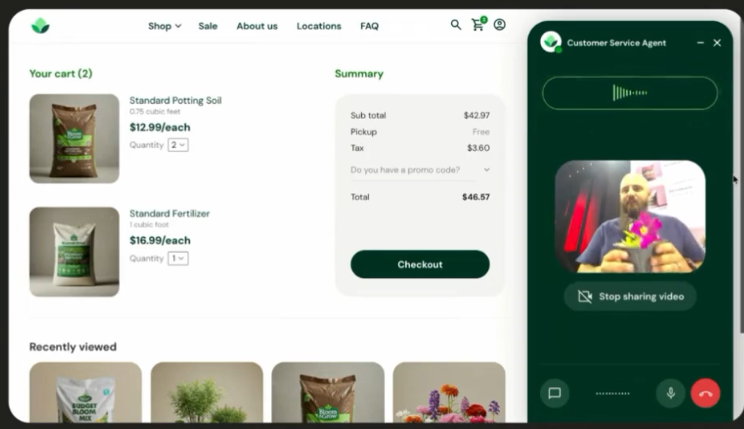 At Google’s Cloud Next 2025 event they announced a new protocol for AI agents to talk to other AI agents. Agent2Agent protocol will radically change how the web works. This isn’t some obscure possibility that may happen in the future. It’s here now!
At Google’s Cloud Next 2025 event they announced a new protocol for AI agents to talk to other AI agents. Agent2Agent protocol will radically change how the web works. This isn’t some obscure possibility that may happen in the future. It’s here now!
In a recent interview, DeepMind CEO Demis Hassabis, whose company is a leading research lab within Google, said that he thinks we will end up with an internet where agents talk to other agents, negotiate things between themselves and then give us back the results. This means the structure of the web and how we use it will change.
Google says, “every enterprise will soon rely on multi-agent systems.” These agents are intelligent systems that act on our behalf using reasoning, planning and memory. We will soon have personal agents that seek out helpful agents on the web and interact with them.
SEO is likely to shift from optimizing for Search engines to optimizing agents to look attractive to other agents.
In this article I’ll discuss a few of the things announced at Google Cloud Next - AgentSpace, Customer Engagement Suite, Agent Development kit and the most interesting announcement, Agent2Agent protocol.
Agentspace
Agentspace is a way for your business to use AI to access and do things with your documents and data. For now, access to Agentspace is invite only. I was told you need to pay for 100 seats in order to have access although I expect this likely will change.
Here’s a clip from the Cloud Next event that demonstrates how Agentspace works. Each individual in the company has their own collection of agents that do things for them. Those agents communicate with company wide agents which can synthesize company data, create reports, draw from Search, and more.
They gave an example of a company having an onboarding agent to welcome new employees. That onboarding agent may communicate with an HR agent, or perhaps payroll agent.
Customer Engagement Suite
This clip of Google’s Customer Engagement Suite is a must watch. In the demo, the man is interacting with a chatbot from a gardening shop. It looks like a typical chatbot, except that he is communicating with voice. The voice sounds very real! He asks about what type of soil he should buy. The agent asks to see his plants and sends a video request. “She” can then see that he is planting petunias. She says that the soil he had added to his cart was the wrong kind and offers to put the right kind in his cart.
They also discuss having a landscaper come over to plant for him. He asks for a 50% discount. The agent says she will need to check with her supervisor first. She then sends a message to a human call center manager who authorizes a 20% discount which she then offers to the customer. They then go on to schedule an appointment.
Google’s Customer Engagement Suite will radically change how we interact with businesses. I expect this suite will not only interact with customers but likely will give us AI driven insights into how customers are interacting with our business as well.
Agent Development Kit
Google’s Agent Development Kit is an open source framework that makes it very easy to build agents. You can do so in under 100 lines of Python. Even if you don’t know how to code, I would recommend spending time trying to understand what this code is doing. You can paste it into ChatGPT, Gemini or Claude and ask for help in implementing it. If you’re brand new to coding try prompts like this,
“I have never coded before, but want to learn how to make an agent by following this documentation [paste in the ADK documentation]. Walk me through everything I need to do. Do it one step at a time as I am a beginner.”
If every business is going to have multiple agents, then there will soon be incredible demand for people who understand how to build agents and, what we’ll talk about next, how agents communicate with each other.
One of the most interesting things I found in the documentation was the list of sample agents in the Agent Garden. These include a data science agent, a customer service agent, and most interestingly, a “Brand Search Optimization” agent. This agent will pinpoint important keywords for a brand, analyze the search results, spy on competitor strategies, compare differences in title tags, descriptions and more and suggest actionable recommendations for improvement.
I’d encourage you to put aside time to try and learn to build this type of agent.
It’s going to be important because the web will shift from users using search engines to find information to agents finding other agents to communicate with.
Agent2Agent Protocol
Google announced a new protocol called the Agent2Agent (A2A) protocol which will enable agents to communicate with each other no matter which LLM was used to create them. Central to this protocol is the “Agent Card”, a JSON-formatted advertisement where agents declare their capabilities, allowing other agents to discover them.
Agents will communicate securely with each other, exchanging the output of its task, called an “artifact.”
How might A2A change how the web works?
I believe that as this protocol develops, much of what currently happens when humans type keywords and search for websites will be replaced with agents seeking out other agents that are likely to be helpful.
For example, say I want to buy a new DSLR camera. Today I might search for “best DSLR camera", browse through manufacturer’s sites and read some reviews. In an agent driven world, I would ask my LLM assistant (perhaps Gemini or ChatGPT or even a private one I’ve created) to do this research for me. Instead of the agent browsing the web, it will search for agent cards that advertise they share information to help with buying cameras. My agent might get specs from the agents from Canon and Nikon and others. It may find a helpful review agent that has been created by a professional photographer who reviews cameras. It will know my likes and preferences, and ask specific questions of those agents so it can return the most helpful answer to me.
Now, there’s an obvious question here and that is what the motivation is for the camera blogger to create content when my agent is not going to be viewing ads or clicking on affiliate links from their site. Google announced an AI agent marketplace. I could see a scenario where people who create truly useful and helpful content will have agents worth paying for.
For example, what incentive will there be for me to write about AI news in a world where your agent can simply curate a list of interesting news for you from recent Search results? If my AI news also includes helpful prompts, thoughts from community members and tips and strategy from me (it does!) then this is an agent that people likely would pay for.
I believe there will be even more incentive to create content in an agent driven ecosystem. However, only those who can create content that is truly worth paying for will likely have success. Perhaps agents will begin to learn which agents others are finding helpful. I can see a world where we work to optimize agents and agent cards to look most attractive to other agents.
Podcast
I have a lot of thoughts on this new protocol and about how Agents will change our lives! Here is my podcast that goes with this article where I talk more about how particular types of businesses are likely to be impacted and what opportunities lie ahead.
Youtube | Apple Podcasts | Spotify | Google Podcasts | Soundcloud
And if you like this, you’ll love my newsletter - it’s free! I work really hard each week to curate the most interesting and helpful news on AI as it changes the online world.
Marie
Further reading:
Vertex AI offers new ways to build and manage multi-agent systems
Customer Engagement Suite with Google AI
Agent Development Kit: Making it easy to build multi-agent applications
Google’s Agent Development Kit Quickstart Guide - These are really simple instructions for getting started building an agent in Python. You can copy and paste this documentation into your favourite LLM and should be able to build a working agent.




Leave a Reply